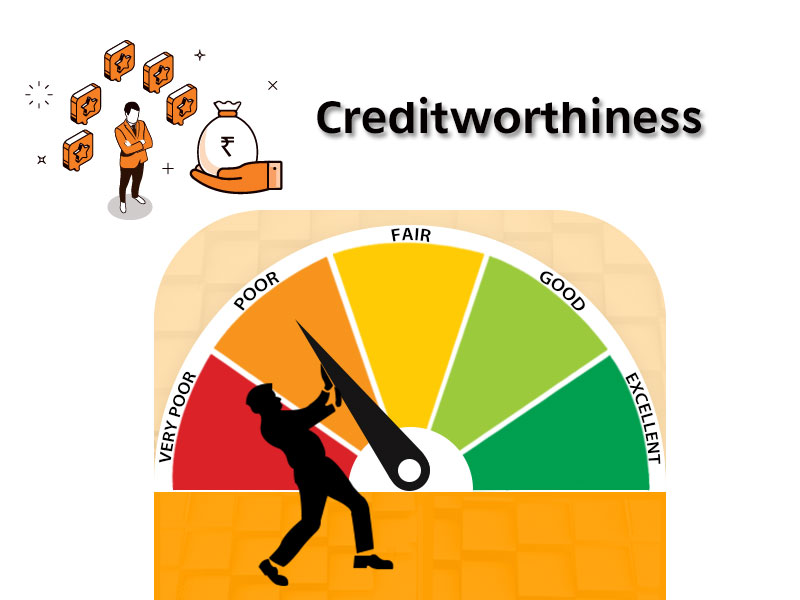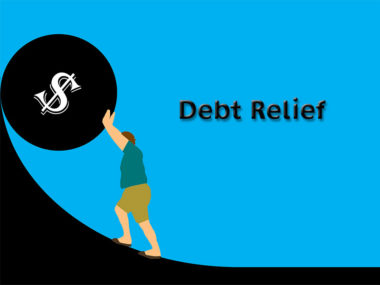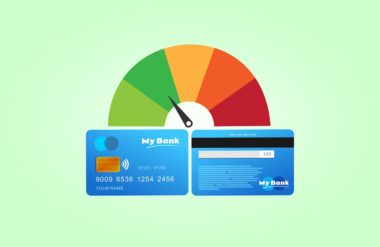
Many people who can’t afford to pay cash for certain purchases often need financing from a bank or other lender to complete the sale. When a lender contemplates loaning you money, they evaluate your creditworthiness. This is the level of trust or confidence the lender has that a borrower will repay the debt.
Becoming worthy of financing can take a lifetime to build but only one bad decision to ruin, which is why it’s important to know how credit works and why it’s important.
Table of Contents
The Importance of Creditworthiness

Though not everyone requires credit to go through life, many people rely on credit to pay for items. They may not have enough cash for making a large purchase.
Too many purchases can lead to overextending your finances. However credit can be used to help pay for a car, home, college education, or recreational vehicle.
For some, financing can help with major repairs to a car or medical procedures or equipment that can improve one’s quality of life. Unplanned major purchases or expenses can be made easier when credit options are available.
Borrowing money isn’t the only reason you need good credit. Other reasons for keeping a strong credit score include:
- Rental applications and security deposit determinations
- Auto insurance and the cost of your premiums
- Utility service applications and equipment borrowing
- Pre-employment background checks
- Cell phone contracts and discounted devices
While you work on building your income, you should also establish the credentials that make you worthy of credit. Credit is offered to individuals who demonstrate an ability to pay for their debts, which puts income and creditworthiness hand-in-hand. As your income grows, you can grow your credit opportunities.
However, the amount of money you make is just one factor that determines your eligibility for lender-based financing. Your income level can determine how much financing you receive, while the other factors impact the cost of financing.
Lender Discretion
Lenders rely on a strategy called risk-based pricing to determine what interest rates they will place on your loan. Lenders make their money by charging fees for their loans or lines of credit. The higher the fees, the more money they will make.
The interest rate on a loan is charged as a percentage of the amount of money loaned. Rates are often paid by the year and are known as an annual percentage rate.
The APR rates vary by the borrower because lenders use the personal credit score to determine the possible risk of extending a loan. Borrowers with high credit scores generally receive lower interest rates than low credit score holders who present higher risks.
For lenders, it is more costly to extend credit to risky borrowers who may make their payments late or fail to pay altogether.
When you factor in a high APR, your purchase becomes much more expensive. Keeping good credit can help save you money when relying on financing for certain purchases.
The Factors Impacting Creditworthiness
There are six key things that give lenders an idea of your trustworthiness with financial obligations. The more favorably you look in each of these categories, the more accessible and affordable financing will be to you.
Poor performance in these areas doesn’t mean you will never qualify for a loan or financing offer, but it can lead to an increased likelihood of a denied application, more costly lending terms, and smaller loan limits.
1. Debt and Income
You must be able to demonstrate that you can pay your monthly debts in addition to your cost-of-living expenses. Using your debt-to-income ratio, a lender will be able to see how what money is available to cover the cost of your obligations.
You are more considered more creditworthy when you have a low debt percentage compared to the income coming in.
Paying down debt is often an easier solution for changing your DTI than getting a new job but increasing your income can also generate a more favorable DTI percentage.
2. Credit Report
There are three credit bureaus that track your debt obligations and provide a full report on your financial history. A lender will use this report to check on your payment history, see how much credit you have used and see if you have defaulted on any past obligations.
Though they are the official reporting bureaus, TransUnion, Experian, and Equifax reports can contain errors that you can dispute.
Fixing an error can help improve your credit score and provide the most accurate financial history for a lender.
3. Credit Score
You are issued a credit score using the information found on your credit report. This is one of the most important factors in determining creditworthiness. The most common scoring model is the FICO scale, where the scores range from 300 to 850.
A score is a snapshot of your debt management abilities and responsibility meeting payment arrangements. The higher the number, the more favorably you appear as a borrower.
Credit scores can be improved by limiting credit usage, paying bills on time, having a lengthy credit history, and limiting the number of debt obligations you have.
4. Down Payment
Large purchases requiring financing typically include vehicles or housing purchases. The lender looks more positively at the applicant if there is a down payment made on the total cost of the loan.
Having a large chunk of cash to put on a purchase lowers the amount of money needing to be borrowed. Lenders tend to give borrowers better loan rates when there are big down payments made.
If you plan to make a large purchase in the future, construct a savings plan to help you have more down payment money available.
5. Collateral
Lenders take a risk by offering you a loan, and many lenders want some kind of guarantee against these risks while waiting for you to repay the debt. Some lenders will require you to secure a loan through collateral. This is an asset of value that will be held against your loan in case you default or fall behind on your payment responsibilities.
You must own the asset for it to be used as collateral. Generally, a house, car, savings account, or certificate of deposit is used to secure a loan. A lender is able to repossess the asset you pledged if you don’t repay your debt.
6. Co-Signer
You can increase your creditworthiness by including a co-applicant during the loan process. If you don’t have enough credit established, bringing in a co-signer allows a lender to use the other individual’s credit and financial responsibility to help guarantee loan repayment.
Co-signers take a risk when joining an application, as your failure to pay goes against their credit and leaves them just as responsible for unpaid debts. Late payments will also impact their credit report and score.
The Ways To Boost Creditworthiness
Even if you don’t plan to buy a car or a house in the near future, it is important to keep your credit score high. If you’ve made mistakes in the past and hurt your credit, you can start to rebuild your worthiness by being proactive.
If you haven’t done anything with your credit so far, it’s a good idea to build credit for the future and start developing a positive credit history.
You can’t change your credit overnight, but these tips can have a dramatic impact on your financial reputation.
Timely Bill Payment
Whether it’s your rent, a utility bill, or a phone bill, always pay your bill on time. Timely payments are the largest influence on your FICO score. If you know you might miss a payment, or it will need to be late, call the creditor immediately and see if they will work with the payment deadline.
Being 30 days late with payment will prompt your creditor to notify the reporting bureaus, and you can ask your creditor to withhold reporting provided you meet the payment extension.
Late payments are reported by increments, and how late you are will also impact your score (such as 30, 60, 90 days, etc.).
Authorized User Permission
If you have no credit or poor credit, being added as an authorized user on the account of a friend or family member can help boost your creditworthiness. It works like adding a co-signer to a loan in that the account of your friend or family now gets reported on your credit report.
A positive payment history, good utilization, and longevity of the account will help your score improve.
Credit Limits
If you have credit but want to improve your overall score, you can ask lenders on your revolving credit accounts to raise the limit. This doesn’t usually happen if you have made late payments or if you don’t have a significant positive credit history, nor should you ask for increased limits if you intend to use the extra funds.
If your balance stays the same in spite of a credit line increase, it reflects positively on your utilization ratio. This option has a high impact on your scores since utilization is a key factor in credit scoring.
Strategic Balance Payments
Another easy way to keep your score in good standing is by maintaining credit balances that are less than 30% of your total limit. For the highest FICO scores, work hard to keep your usage under 10% of your available balance.
By paying down the balance just before the end of the billing cycle or by making several payments through the month, you can help lower the utilization reported by the credit bureaus.
This is a fast-working option since lower utilization will instantly factor into a score.
Collections
Going into collections is a sure way to destroy your creditworthiness. Collections put a negative mark on your report that can last for seven years. You may run the risk of being sued for the remaining balance on the account. Paying off a collection account should be prioritized over other debts that are in good standing.
You may be able to have a collection account taken off the credit report if it is too old to be included or if it doesn’t accurately reflect the debt.
Secured Credit
Unsecured and secured credit are two options when working with lenders. Unsecured credit means the lender hasn’t required collateral for your loan, and credit cards typically fall into this category. Secured credit usually happens with automobile or housing lenders, as the asset is used as a financial guarantee. You give your credit a boost by using a secured credit card.
These cards require a cash deposit usually equal to the credit limit to be used as collateral. Make your payments on time to help your credit.
Reporting Errors
You are entitled to a yearly credit check from each of the three leading credit bureaus. Pulling your credit report lets you check the accuracy of your open accounts. A bill may be fully paid but never marked or closed, potentially leading to late payment marks or open accounts on your history.
Old, negative information can drop your score as well. If you find an error, open a dispute and have the proof of error ready to submit. The credit bureau is allowed 30 days to respond, but it is a way to work on your score.
Credit Mix
Have a good mix of revolving and installment credit accounts on your report for a better score. Your creditworthiness may not qualify you for an auto loan just yet. But you may be able to get a credit-builder loan from a local credit union or bank to raise your score. A mix of credit cards can also improve your utilization factor.
Take Control of Your Creditworthiness
At Fiscal Tiger, we strive to empower each individual to take control of their personal finances. Find the latest information on building or repairing your creditworthiness and find out to check your credit scores.
Armed with the right information, you can make wise decisions concerning your spending and financing options. Do more with your money through Fiscal Tiger.





